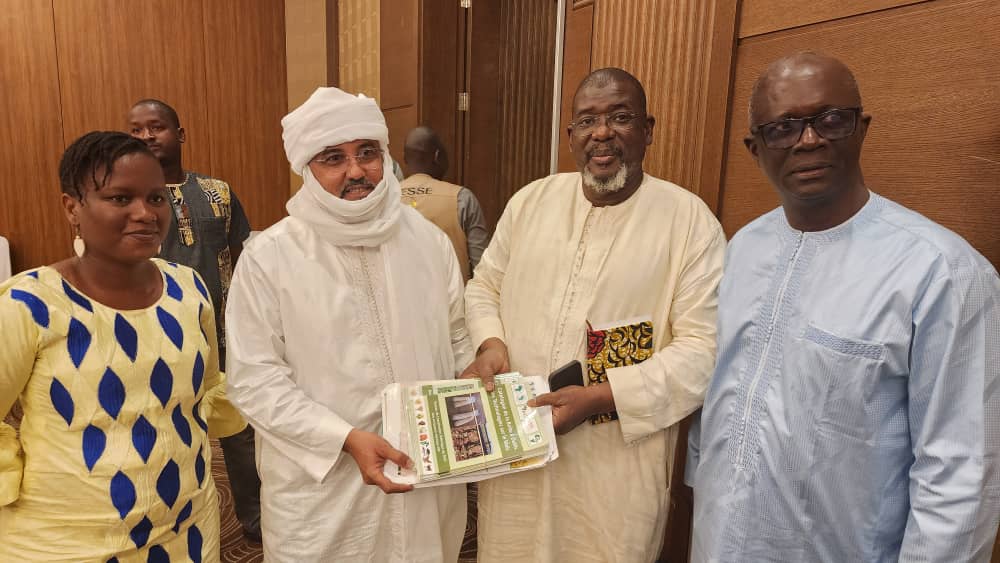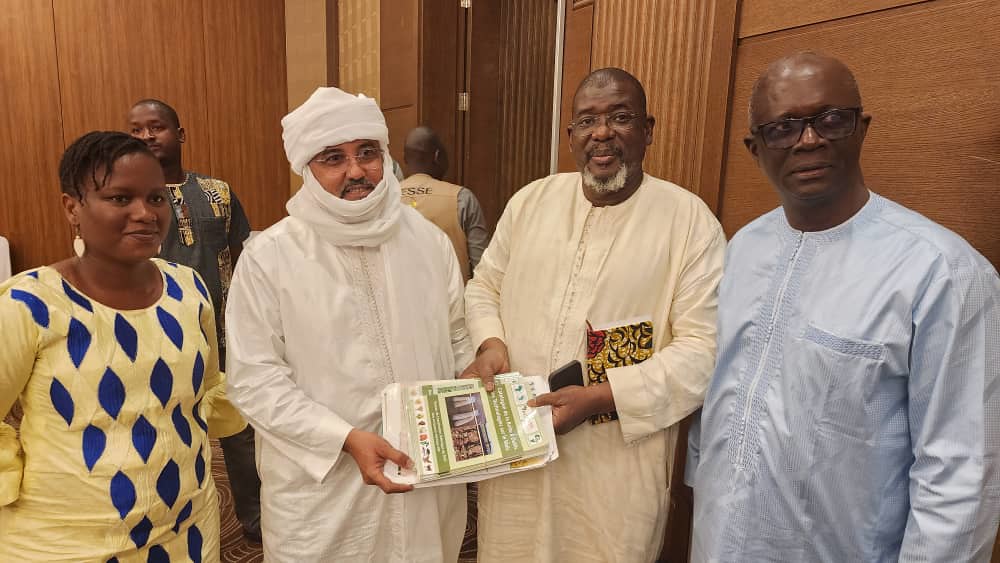Facilitating Change: TAAT sets sight on Emergency Food & Nutrition Security in Mali

The Emergency Food and Nutrition Security and Production Project (PUPSAN-AEFPF) is a project designed to address the multidimensional crisis in Mali since 2012.
The project is being implemented by the Government of Mali, with financing from the African Development Bank and will focus on three components: improving access to improved seeds and adapted technologies, facilitating producers’ access to quality fertilizers, and improving governance, supporting the implementation of reforms in the seed and fertilizer sectors, and project coordination and management.
The Technologies for African Agricultural Transformation (TAAT) programme, represented by Dr Ernest Asiedu, the Country Engagement Officer West Africa Region, and Dr Dêêdi Sogbohossou, Programme Officer, were in Bamako, Mali from 11th to 14th October 2023 to provide technical support to the launching of the PUPSAN-AEFPF Project.
The TAAT team made significant progress with the drafting of the PUPSAN/AEFPF-TAAT Memorandum of Understanding (MoU). The MoU outlines critical activities for the TAAT Wheat Compact, led by the International Center for Agricultural Research in the Dry Areas (ICARDA), and the Rice Compact, led by the AfricaRice Centre.
It equally provides a roadmap for advancing the wheat and rice value chains within the PUPSAN/AEFPF project. This anticipated agreement sets the stage for collaboration, emphasising forthcoming technical assistance that is poised to play a pivotal role in enhancing the development and sustainability of Mali’s wheat and rice sectors under the PUPSAN/AEFPF Project.
ICARDA will lead the charge in developing the Wheat Value Chain, orchestrating technical assistance through a comprehensive series of targeted activities. This multifaceted approach will involve building the capacity of Mali’s l’Institut d’Economie Rurale (IER) staff, delving into wheat selection, breeding methods, and data analysis.
Diverse training initiatives will be implemented for IER, DNA, ORS, and ON staff, focusing on varietal dissemination and the certification process for wheat seeds.
The intervention will also facilitate a pivotal national consultation meeting on the wheat seed sector, strategically designed to pinpoint improvement opportunities.
Collaborative efforts with the Forum for Agricultural Research in Africa (FARA) will be evident in establishing and managing innovation platforms. Furthermore, the intervention will include training sessions in best agricultural practices, accompanied by the meticulous updating and distribution of materials addressing various aspects of wheat cultivation.
AfricaRice will lead the initiative to strengthen the Rice Value Chain, extending technical support to enhance various facets of the rice value chain. This comprehensive approach will include capacity building for agricultural extension agents, with a focus on best practices and the incorporation of innovative applications such as RiceAdvice and WeedManager. Simultaneously, training sessions will be conducted on ASI operations for agricultural extension agents and representatives from rice processing, aimed at streamlining post-harvest processes.
Another notable outcome relates to TAAT Phase II, where the Wheat, Sorghum/Millet, and Livestock Compacts are set to showcase a strategic fusion of technological innovation, capacity building, and community engagement.
This inclusive approach foresees advancements in crop production, pest control, soil fertility, post-harvest management, market access, and animal health, painting a promising picture for Mali’s holistic development of crop and livestock sectors.
Under the future Wheat Value Chain (ICARDA), complementary activities will be designed to fortify the wheat value chain in alignment with the PUPSAN/AEFPF – TAAT MoU.
Other activities in the Sorghum and Millet Value Chain, led by the International Crops Research Institute for the Semi-Arid Tropics (ICRISAT), aim to advance agricultural practices and ensure sustainable production. Planned initiatives include the production of first-generation seeds of improved varieties in collaboration with IER and DNA.
Efforts will focus on strengthening future extension and input distribution systems. Awareness campaigns and training sessions will address the biological control of pests like the Fall Armyworm and the millet ear miner.
Future training for extension staff in collaboration with the International Fertilizer Development Center (IFDC) will cover integrated soil fertility management and Striga control. Capacities in future post-harvest management and market development will be enhanced, and women’s groups will undergo training through the Smart-Food approach, contributing to improved household nutrition.
Within the Livestock Value Chain, the TAAT Livestock Compact led by the International Livestock Research Institute (ILRI) is poised to undertake a series of activities in Mali with a focus on animal health. These include the production of 900,000 doses of vaccines for 30,000 households, prioritizing the well-being of animals. Capacity building for private animal health service companies, ensuring a gender-inclusive approach to enhance expertise.
Farmers’ knowledge on best herd health practices is set to be augmented through targeted educational efforts. Furthermore, TAAT Livestock Compact will establish a future-proof outbreak reporting mechanism and provide training for veterinarians and community health workers in disease management, thus contributing to livestock Mali’s overall health and well-being. The cohesive integration of these initiatives will underscore a concerted effort to fortify and improve the overall resilience and efficiency of the Rice Value Chain.
The culmination of the TAAT mission in Mali was the three-day PUPSAN/AEFPF Project launch, encompassing a thorough orientation on project implementation modalities by the African Development Bank and the Project Implementation Unit.
TAAT experts further highlighted how TAAT is poised to provide technical assistance to the Project 2 of the Programme to Strengthen Resilience to Food and Nutrition Insecurity in the Sahel (P2-P2RS) and the Mali Country Compact emerging from the Dakar 2 Summit.
Engaging discussions with stakeholders underscored crucial aspects such as the significance of bolstering local production capacities, strategic investments in key value chains, and the pivotal role played by TAAT in facilitating collaboration and synergy among diverse research centres, national partners, and other collaborators. This concerted effort aims to enhance agricultural capacity and elevate the overall capabilities of the country in the agricultural sector.
The official Project launch on October 13th, which featured speeches from the AfDB Country Manager and Project Coordinator, Dramane Diarra, marked a significant milestone. Mali’s Minister of Agriculture, Hon. Dr. Lassine Dembele, officially launched the project with high expectations. The launch event included the presentation of training and extension materials, reinforcing the well-prepared TAAT Value Proposition and fostering satisfaction among participants for effective collaboration in project implementation.
With the upcoming signing of the MoUs, the release of funds, and the commencement of project activities, the technical assistance provided by TAAT to the Project is poised to enter a phase of active implementation in 2024. Incorporating new recommendations into future project designs, such as those stemming from the Mali Country Compact, will ensure alignment with the latest best practices and lessons learned for sustained success.


